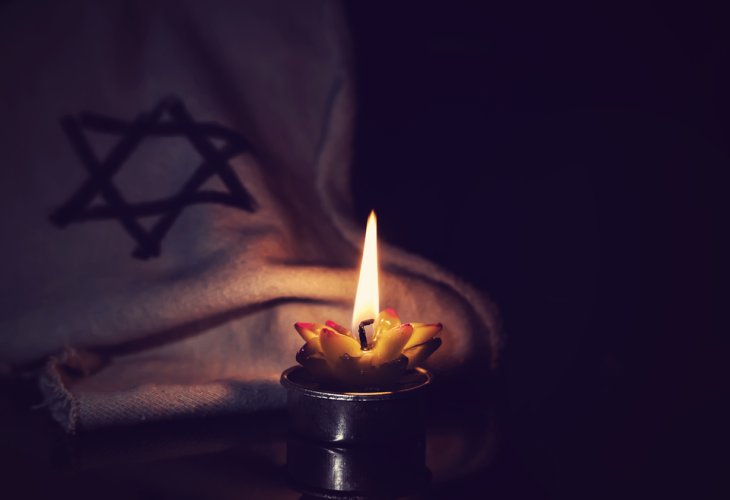Engagement with Youth: Let’s Talk About It – Do We Really Remember?
Where was Hashem during the Holocaust? How should we view and remember the Holocaust? Warning: A deeply challenging column.
- עידן נגאר
- פורסם כ"ז ניסן התשע"ט
 (Photo: shutterstock)
(Photo: shutterstock) #VALUE!
Here it comes, and no, it is not a particularly happy day, it’s Holocaust Remembrance Day.
On this day, as we all know, we remember those holy Jews, from Ashkenaz and Sepharad, with pure souls, just like us, who were erased by that wicked one, may his name and memory be blotted out. The matter of the Holocaust raises many questions for quite a few people: how could it be that six million people were wiped off the Jewish map?! Jews from all walks of life, non-observant, observant, Hasidim, the ultra-Orthodox, even rebbes and holy rabbis were annihilated all at once.
The biggest question is, where was Hashem during the Holocaust? It’s a difficult question, people think. But actually, it’s not all that problematic. Let me tell you something I heard from Rabbi Fanger: A few years ago, a group of people gathered around an elderly-looking woman, it was evident she was angry and agitated, ready to explode, speaking and rebuking Hashem. "So tell me," she scolded, "Where was He? Why didn’t He save them, He abandoned us, abandoned my mother!" The people apparently turned pale at the question; maybe they had something to answer, but it was probably difficult in the presence of an angry woman. In a few moments, a rabbi walking by on the street arrived; the woman turned her face to the rabbi along with the others. "Hello, Rabbi!" she said in a scornful tone, "Tell me, where was your God during the Holocaust???" The rabbi listened to her words and was silent for a few moments. "Well, you see, he has no answer, he abandoned him too!" "Do you want to know where He was?", the rabbi asked calmly. "Well, let’s see if you can, he thinks he knows," she mocked. "Then I will tell you".
"When Hitler sat in his office and thought to take your mother from the Warsaw Ghetto, after she worked like a miserable slave and was shot in the head mercilessly and all her head bled, and they made soap from her and threw all her bones to who knows where, and they even laughed at her and didn’t even say half a Kaddish for her, when this happened, that’s where He was".
These words were said with increasing speed, and his voice grew. No one missed what he said; everyone stood silent, mouths agape. It was shocking, but not as shocking as how the woman heard it. She looked at him, changing colors, in complete shock, not knowing what to say, just stopped in her place. The rabbi continued on his way and left.
Shocked? I understand you. Not shocked? I understand you too.
Let’s admit the truth, it’s always easy and pleasant to see Hashem when we are flooded with wealth and happiness, with joy up to the heavens when nothing can go wrong. But when things are bad? Not exactly, right? Then we struggle to see, things become a little blurry, no reception, and various other complications.
Let’s not get confused; the rabbi’s response was sharp and clear, it presented the truth in its entirety, Hashem is not only present in the beautiful places in life but also in the darkest, hardest, and bitterest times we can and cannot imagine, that is the greatest wisdom to see Him there. It is a life’s work, no doubt about it, but anyone who wants to see Hashem only in beautiful situations will not succeed in maintaining a close connection with Him.
The Holocaust was one of the hardest things that happened to us as a people in recent years, it’s not something we want to forget, not just because we want to ensure such horror never happens again, but mainly to remember that we still exist, we are on the map of life, the people of Israel live.
Let’s not forget, the State of Israel chooses to commemorate Holocaust Remembrance Day every year on the same day, with a focus mainly on the Jews of the Holocaust, but what about those Jews from history? Pogroms, exterminations, attack operations, deportation, in which many Jews were also killed, completely annihilated, we must also remember them, that even before the Holocaust, there were others who suffered and did not give up, continued forward - the people of Israel live. Remembering one day a year for the Jews of the Holocaust is a bit hypocritical, why not remember all those millions who were killed in the diaspora and commemorate them in our hearts every day?
This day can be viewed in two ways: depression, sadness, and despair, or revival, establishment, and life. Believers absolutely and assertively choose the second option - revival, establishment, and life, without a doubt. There is no room for despair and depression on a day when we remember our loved ones; we must remember the loss and look forward with hope and satisfaction. Remember that we have strong ancestors who stood up to fight for our true identity – remember and never forget, remember that we are Jews and do not forget what makes us that way, keeping Torah and mitzvot with faith and confidence.
The media will likely flood you with interview shows, documentaries, and the like. Don’t let all this bring you to extreme downcast, Hidabrut has a lot to strengthen you on this day, yes, especially on this day. Grow in pain.

